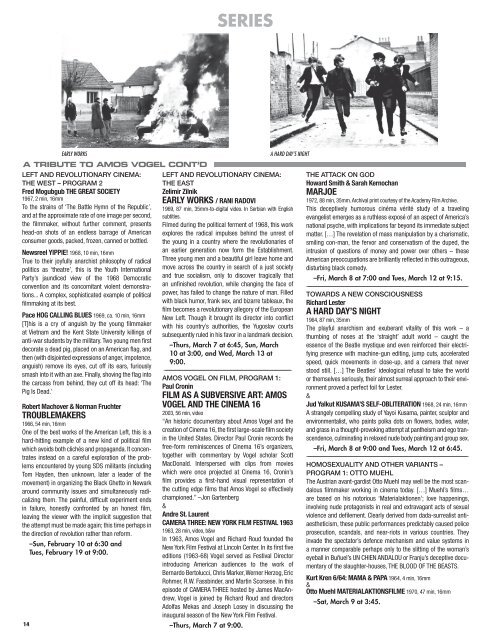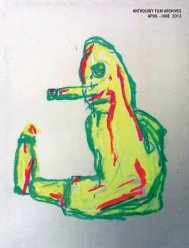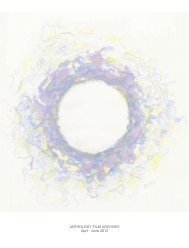quarterly pdf - Anthology Film Archives
quarterly pdf - Anthology Film Archives
quarterly pdf - Anthology Film Archives
You also want an ePaper? Increase the reach of your titles
YUMPU automatically turns print PDFs into web optimized ePapers that Google loves.
LEFT AND REVOLUTIONARY CINEMA:<br />
THE WEST – PROGRAM 2<br />
Fred Mogubgub THE GREAT SOCIETY<br />
1967, 2 min, 16mm<br />
To the strains of ‘The Battle Hymn of the Republic’,<br />
and at the approximate rate of one image per second,<br />
the fi lmmaker, without further comment, presents<br />
head-on shots of an endless barrage of American<br />
consumer goods, packed, frozen, canned or bottled.<br />
Newsreel YIPPIE! 1968, 10 min, 16mm<br />
True to their joyfully anarchist philosophy of radical<br />
politics as ‘theatre’, this is the Youth International<br />
Party’s jaundiced view of the 1968 Democratic<br />
convention and its concomitant violent demonstrations...<br />
A complex, sophisticated example of political<br />
fi lmmaking at its best.<br />
Pace HOG CALLING BLUES 1969, ca. 10 min, 16mm<br />
[T]his is a cry of anguish by the young fi lmmaker<br />
at Vietnam and the Kent State University killings of<br />
anti-war students by the military. Two young men fi rst<br />
decorate a dead pig, placed on an American fl ag, and<br />
then (with disjointed expressions of anger, impotence,<br />
anguish) remove its eyes, cut off its ears, furiously<br />
smash into it with an axe. Finally, shoving the fl ag into<br />
the carcass from behind, they cut off its head: ‘The<br />
Pig Is Dead.’<br />
Robert Machover & Norman Fruchter<br />
TROUBLEMAKERS<br />
1966, 54 min, 16mm<br />
One of the best works of the American Left, this is a<br />
hard-hitting example of a new kind of political fi lm<br />
which avoids both clichés and propaganda. It concentrates<br />
instead on a careful exploration of the problems<br />
encountered by young SDS militants (including<br />
Tom Hayden, then unknown, later a leader of the<br />
movement) in organizing the Black Ghetto in Newark<br />
around community issues and simultaneously radicalizing<br />
them. The painful, diffi cult experiment ends<br />
in failure, honestly confronted by an honest fi lm,<br />
leaving the viewer with the implicit suggestion that<br />
the attempt must be made again; this time perhaps in<br />
the direction of revolution rather than reform.<br />
14<br />
–Sun, February 10 at 6:30 and<br />
Tues, February 19 at 9:00.<br />
SERIES<br />
EARLY WORKS A HARD DAY’S NIGHT<br />
A TRIBUTE TO AMOS VOGEL CONT’D<br />
LEFT AND REVOLUTIONARY CINEMA:<br />
THE EAST<br />
Zelimir Zilnik<br />
EARLY WORKS / RANI RADOVI<br />
1969, 87 min, 35mm-to-digital video. In Serbian with English<br />
subtitles.<br />
<strong>Film</strong>ed during the political ferment of 1968, this work<br />
explores the radical impulses behind the unrest of<br />
the young in a country where the revolutionaries of<br />
an earlier generation now form the Establishment.<br />
Three young men and a beautiful girl leave home and<br />
move across the country in search of a just society<br />
and true socialism, only to discover tragically that<br />
an unfi nished revolution, while changing the face of<br />
power, has failed to change the nature of man. Filled<br />
with black humor, frank sex, and bizarre tableaux, the<br />
fi lm becomes a revolutionary allegory of the European<br />
New Left. Though it brought its director into confl ict<br />
with his country’s authorities, the Yugoslav courts<br />
subsequently ruled in his favor in a landmark decision.<br />
–Thurs, March 7 at 6:45, Sun, March<br />
10 at 3:00, and Wed, March 13 at<br />
9:00.<br />
–––––––––––––––––––––––––––––––––––––––––––––––––––––––––––––––––––––––––––––––––––––––––––––<br />
AMOS VOGEL ON FILM, PROGRAM 1:<br />
Paul Cronin<br />
FILM AS A SUBVERSIVE ART: AMOS<br />
VOGEL AND THE CINEMA 16<br />
2003, 56 min, video<br />
“An historic documentary about Amos Vogel and the<br />
creation of Cinema 16, the fi rst large-scale fi lm society<br />
in the United States. Director Paul Cronin records the<br />
free-form reminiscences of Cinema 16’s organizers,<br />
together with commentary by Vogel scholar Scott<br />
MacDonald. Interspersed with clips from movies<br />
which were once projected at Cinema 16, Cronin’s<br />
fi lm provides a fi rst-hand visual representation of<br />
the cutting edge fi lms that Amos Vogel so effectively<br />
championed.” –Jon Gartenberg<br />
&<br />
Andre St. Laurent<br />
CAMERA THREE: NEW YORK FILM FESTIVAL 1963<br />
1963, 28 min, video, b&w<br />
In 1963, Amos Vogel and Richard Roud founded the<br />
New York <strong>Film</strong> Festival at Lincoln Center. In its fi rst fi ve<br />
editions (1963-68) Vogel served as Festival Director<br />
introducing American audiences to the work of<br />
Bernardo Bertolucci, Chris Marker, Werner Herzog, Eric<br />
Rohmer, R.W. Fassbinder, and Martin Scorsese. In this<br />
episode of CAMERA THREE hosted by James MacAndrew,<br />
Vogel is joined by Richard Roud and directors<br />
Adolfas Mekas and Joseph Losey in discussing the<br />
inaugural season of the New York <strong>Film</strong> Festival.<br />
–Thurs, March 7 at 9:00.<br />
THE ATTACK ON GOD<br />
Howard Smith & Sarah Kernochan<br />
MARJOE<br />
1972, 88 min, 35mm. Archival print courtesy of the Academy <strong>Film</strong> Archive.<br />
This deceptively humorous cinéma vérité study of a traveling<br />
evangelist emerges as a ruthless exposé of an aspect of America’s<br />
national psyche, with implications far beyond its immediate subject<br />
matter. […] The revelation of mass manipulation by a charismatic,<br />
smiling con-man, the fervor and conservatism of the duped, the<br />
intrusion of questions of money and power over others – these<br />
American preoccupations are brilliantly refl ected in this outrageous,<br />
disturbing black comedy.<br />
–Fri, March 8 at 7:00 and Tues, March 12 at 9:15.<br />
––––––––––––––––––––––––––––––––––––––––––––––––––––––––––––––––––––––––––––––––––––––––––––––––––––––––––––––––––––––<br />
TOWARDS A NEW CONSCIOUSNESS<br />
Richard Lester<br />
A HARD DAY’S NIGHT<br />
1964, 87 min, 35mm<br />
The playful anarchism and exuberant vitality of this work – a<br />
thumbing of noses at the ‘straight’ adult world – caught the<br />
essence of the Beatle mystique and even reinforced their electrifying<br />
presence with machine-gun editing, jump cuts, accelerated<br />
speed, quick movements in close-up, and a camera that never<br />
stood still. […] The Beatles’ ideological refusal to take the world<br />
or themselves seriously, their almost surreal approach to their environment<br />
proved a perfect foil for Lester.<br />
&<br />
Jud Yalkut KUSAMA’S SELF-OBLITERATION 1968, 24 min, 16mm<br />
A strangely compelling study of Yayoi Kusama, painter, sculptor and<br />
environmentalist, who paints polka dots on fl owers, bodies, water,<br />
and grass in a thought-provoking attempt at pantheism and ego transcendence,<br />
culminating in relaxed nude body painting and group sex.<br />
–Fri, March 8 at 9:00 and Tues, March 12 at 6:45.<br />
––––––––––––––––––––––––––––––––––––––––––––––––––––––––––––––––––––––––––––––––––––––––––––––––––––––––––––––––––––––<br />
HOMOSEXUALITY AND OTHER VARIANTS –<br />
PROGRAM 1: OTTO MUEHL<br />
The Austrian avant-gardist Otto Muehl may well be the most scandalous<br />
fi lmmaker working in cinema today. […] Muehl’s fi lms…<br />
are based on his notorious ‘Materialaktionen’; love happenings,<br />
involving nude protagonists in real and extravagant acts of sexual<br />
violence and defi lement. Clearly derived from dada-surrealist antiaestheticism,<br />
these public performances predictably caused police<br />
prosecution, scandals, and near-riots in various countries. They<br />
invade the spectator’s defence mechanism and value systems in<br />
a manner comparable perhaps only to the slitting of the woman’s<br />
eyeball in Buñuel’s UN CHIEN ANDALOU or Franju’s deceptive documentary<br />
of the slaughter-houses, THE BLOOD OF THE BEASTS.<br />
Kurt Kren 6/64: MAMA & PAPA 1964, 4 min, 16mm<br />
&<br />
Otto Muehl MATERIALAKTIONSFILME 1970, 47 min, 16mm<br />
–Sat, March 9 at 3:45.




